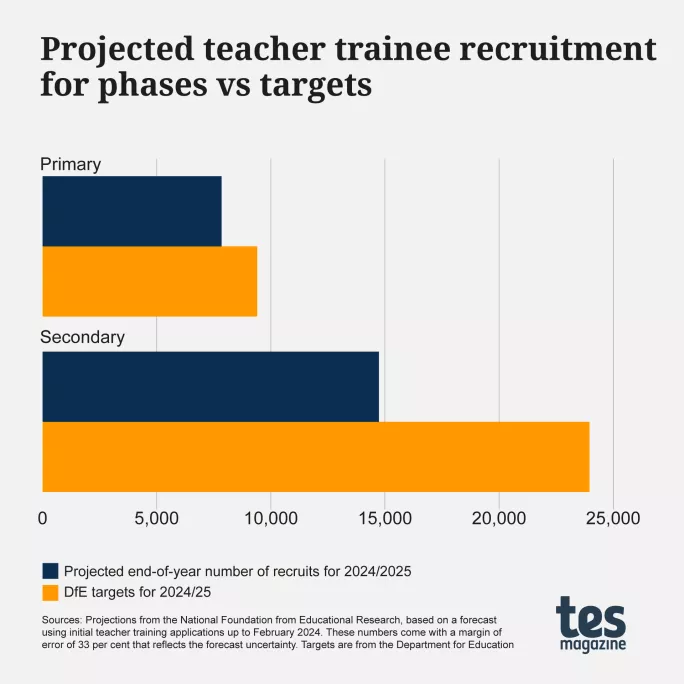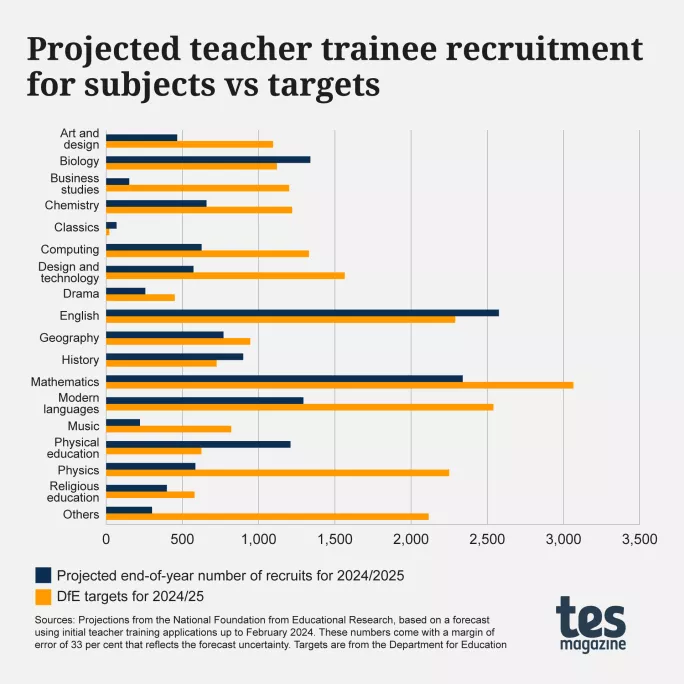DfE could under-recruit in 10 secondary subjects this year

The government is “at risk of under-recruiting” secondary trainee teachers for 10 out of 17 subjects for next year, experts have warned.
Fears of under-recruitment of teachers for the third year in a row remain despite a rise in bursaries, an increase in applications from both at home and abroad and a reduction in recruitment targets, according to a major report published today.
The National Foundation for Educational Research (NFER) has today estimated that the Department for Education’s initial teacher trainee recruitment target for secondary teachers could be missed by 39 per cent this year - with maths and physics among the subjects included in the shortfall.
And NFER school workforce lead Jack Worth has warned that the DfE’s planned updated recruitment and retention strategy is “all the more needed”, saying: “The longer we wait for the strategy, the longer it is before those actions gets implemented.”
Teacher training recruitment shortfalls predicted
The NFER has made forecast projections of how many teacher trainees will be recruited by subject for 2024-25.
Its report calls for teachers to be awarded a “pay premium” to compensate for the lack of remote and hybrid working opportunities in their jobs, compared with other graduates.
The report says the pay premium for teachers should be 1.8 per cent, which would need to be awarded on top of the pay rise required to match teachers’ earnings growth with the wider economy.
Tes revealed last year that the DfE was set to refresh its 2019 recruitment and retention strategy, with a timeline later set for publication this winter. However, Tes later unveiled that ministers had delayed publication amid “uncertainty” over future planning.
- Teacher training recruitment: Secondary ITT target missed by half
- Exclusive: DfE workforce strategy delayed amid “uncertainty”
- Workload taskforce: DfE to scrap performance-related pay
Last year the government missed its target for the recruitment of secondary teacher trainees by 50 per cent.
The NFER report, funded by the Nuffield Foundation, suggests that more generous training bursaries, and policies to attract international applicants, have shown signs of increasing recruitment, but the improvements are likely to be “marginal”.
In 2024-25 the following teacher training bursaries will be available, the DfE announced last year:
- £28,000 in chemistry, computing, mathematics and physics.
- £25,000 in biology, design and technology, geography and languages, including ancient languages.
- £10,000 in art and design, English, music and religious education.
However, despite these increases, recruitment concerns remain for many subjects.


NFER predictions show that, overall, secondary recruitment is likely to be around 61 per cent of the target - based on ITT applications made up to February 2024. The recruitment of primary trainee teachers could reach just 83 per cent of the government-set target.
And some subjects could miss government-set recruitment targets by up to 87 per cent, the predictions by the NFER show.
This year physics once again saw less than one-fifth of the target number of trainees recruited on to courses. While the NFER predictions show some improvement, the subject is still projected to miss the target by 74 per cent.
And music is predicted to experience recruitment woes again this year, with just 27 per cent of the recruits needed projected to join the profession.
Maths is set to under-recruit by around a quarter (24 per cent), design and technology by 63 per cent, and computing by 53 per cent.
The NFER has warned that ambitious and “radical” actions are urgently needed to address teacher recruitment and retention challenges.
However, English, which recruited just 74 per cent of the teacher trainees needed for this year, is set to surpass its target for 2024-25, recruiting 12 per cent above that target.
Meanwhile, biology is projected to exceed its target by 20 per cent.
International recruitment won’t be enough
While applications to teacher training this year have risen year-on-year, this increase has partly been driven by a boost in international applications.
Tes revealed earlier this year that the government was looking at how it could increase schools’ international recruitment to plug teacher gaps.
However, Mr Worth told Tes: “International recruitment isn’t going to build the shortfalls.”
He said that while international applications are up, “there are a lot of rejections and a lot of withdrawals before enrolling”.
“We should be cautious about seeing this as a really significant increase. And it’s certainly not going to be some silver bullet that solves the shortfalls in physics or any other subject really,” Mr Worth added.
‘Little progress’ on workload
The NFER report also calls on the government to set up an independent review focused on how to reduce teachers’ workload related to behaviour management and pastoral care.
The report says that “little progress” has been made on cutting high teacher workload, and teachers say that pupil behaviour is “driving higher workload”.
The latest DfE Working Lives of Teachers and Leaders survey, carried out last year, revealed that more than a third of teachers and leaders were considering quitting the sector over the next 12 months, with workload cited as the main reason.
And a recent TUC study found that the teaching profession had the most workers doing unpaid overtime in the past year.
In January the DfE published the initial recommendations made by the workload reduction “task force”, which was commissioned to look at how to cut five hours from teachers’ working week. Final recommendations are expected this spring.
Teacher pay rise ‘must exceed 3.1 per cent’
Last year teachers in England were offered a 6.5 per cent pay rise for 2023-24. In 2022-23 experienced teachers received a 5 per cent pay rise.
But the NFER study suggests that it is “unlikely” that last year’s pay award has significantly contributed to narrowing the gap in earnings growth compared with the wider labour market.
Its report calls for the 2024-25 pay award for teachers to exceed 3.1 per cent and be fully funded to “improve the competitiveness of teacher pay”.
Geoff Barton, general secretary of the Association of School and College Leaders, said: “Society cannot function without teachers and we currently have a critical shortage in our schools and colleges. It is high time the government gave this crisis the attention it warrants.”
A Department for Education spokesperson said: “To continue to attract the brightest and the best teachers, we offer bursaries and scholarships up to £30,000 for chemistry, computing, mathematics and physics teachers.
“We are taking steps to support their wellbeing and ease workload pressures, which includes plans to support schools to reduce working hours for teachers and leaders by five hours per week.”
For the latest education news and analysis delivered directly to your inbox every weekday morning, sign up to the Tes Daily newsletter
Register with Tes and you can read two free articles every month plus you'll have access to our range of award-winning newsletters.
Keep reading with our special offer!
You’ve reached your limit of free articles this month.
- Unlimited access to all Tes magazine content
- Save your favourite articles and gift them to your colleagues
- Exclusive subscriber-only stories
- Over 200,000 archived articles
- Unlimited access to all Tes magazine content
- Save your favourite articles and gift them to your colleagues
- Exclusive subscriber-only stories
- Over 200,000 archived articles
topics in this article



